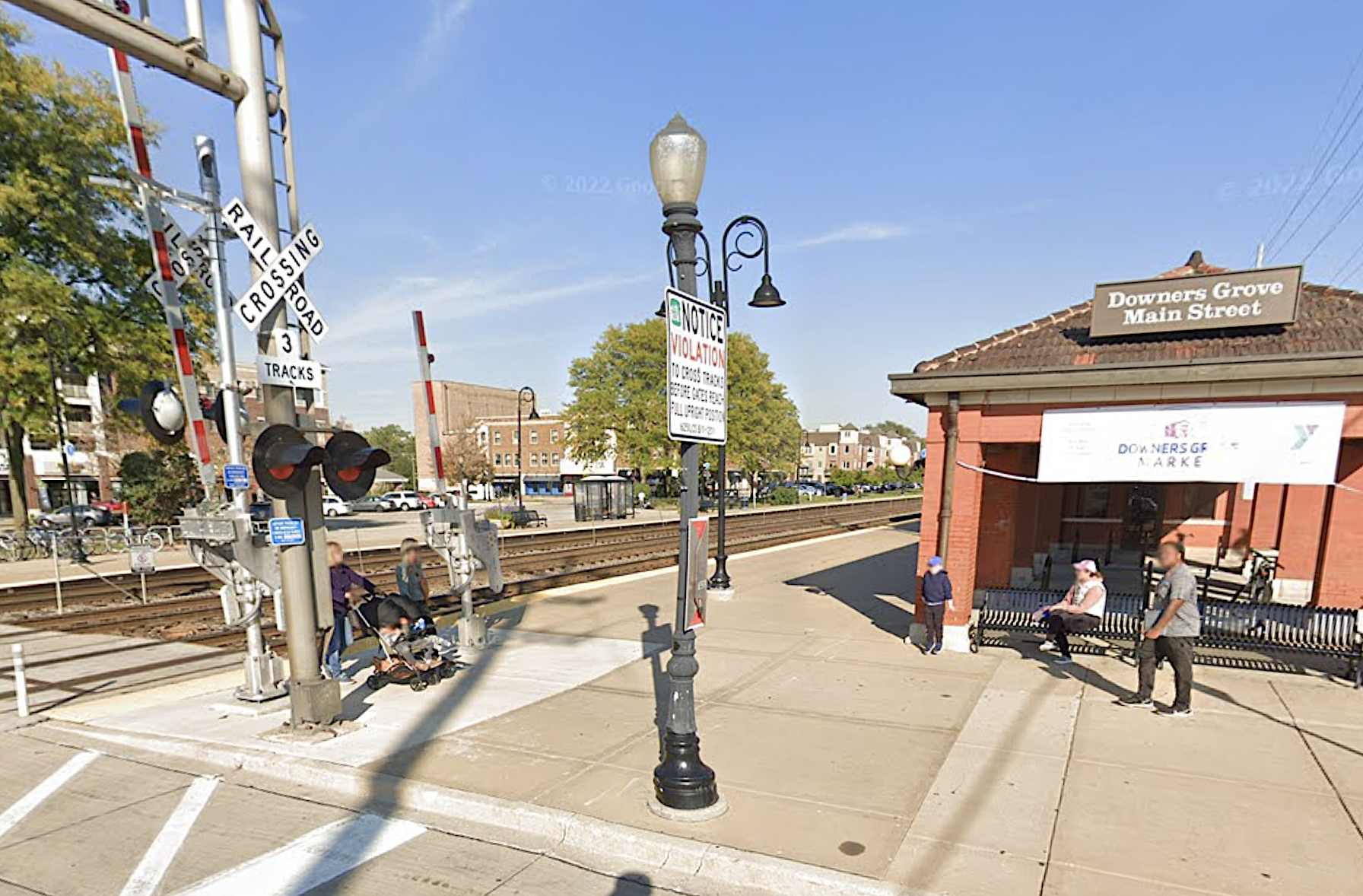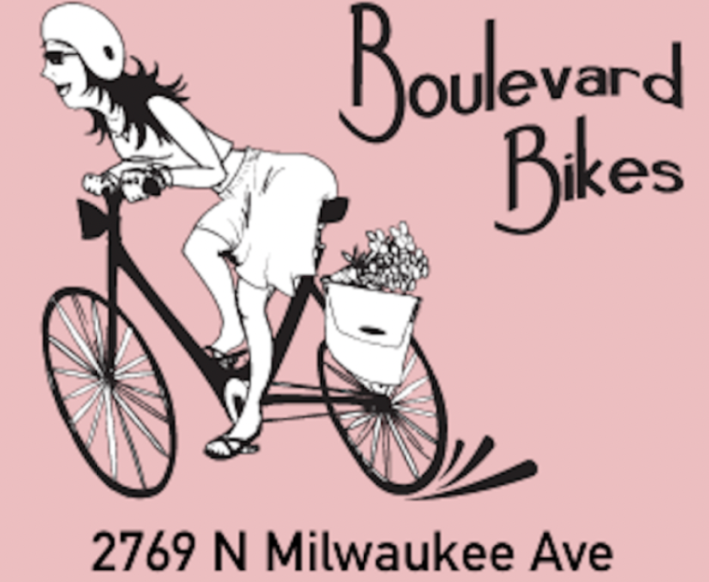
By Ellen Steinke
Southwest-suburban State Sen. John Curran (R-Lemont) represents a district stitched together by trains. Two Metra lines and five Metra stations sit within its borders: Belmont, Fairview Avenue, and Downers Grove Main Street on the busy BNSF line, plus Lemont and Willow Springs on the Heritage Corridor. Thousands of commuters use those stations every weekday.
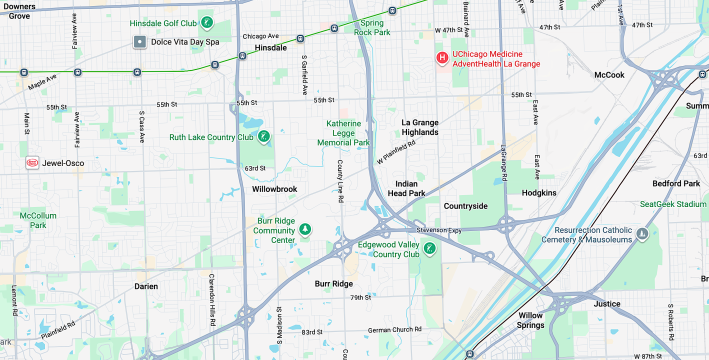
Despite this, when the Illinois state legislature had a chance this spring to address the looming $771 million Chicagoland transit fiscal cliff with longterm funding, Curran, like all of his Republican Senate colleagues, voted no. Then he doubled down with a Chicago Tribune op-ed, framing the plan as a "Chicago bailout" for "the grossly mismanaged CTA and decades of unfunded pensions," calling a modest delivery fee "one of the most... regressive taxes in decades."
Here’s what he didn’t say. Since transit funding talks began in early 2024, Curran has collected more than $370,000 from road construction unions. These are the groups most invested in keeping billions flowing to highways instead of saving bus and train service.
Campaign finance records show that in August 2024, the Chicagoland Operators Joint Labor-Management PAC (better known as Local 150) gave Curran $250,000. Two months later, they cut him another check for $107,750.
Those weren’t just big donations. They were the two largest of Curran’s career.
Zoom out, and the pattern is even clearer: Curran has received nearly $688,000 from Local 150 since 2017, and another $80,500 from LiUNA, another prominent road construction union, since 2018. All told, that’s three-quarters of a million dollars from road-building interests alone.
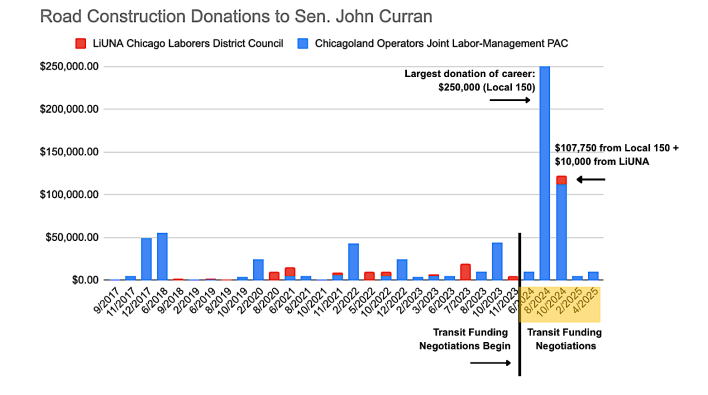
Curran got the biggest donations of his career from road construction unions, Chicagoland Operators Joint Labor Management PAC (funded by Local 150) and LiUNA, during the transit funding negotiation period.
Why do road builders care? It’s not hard to connect the dots.
Local 150 and LiUNA represent workers who pour concrete, grade highways, and keep the tollway humming. They have every reason to make sure Illinois prioritizes roads because that’s where their members' paychecks come from. To be clear, unions are an overall positive force, and these groups were not the only obstacle. However, they were among the most vocal opponents of new funding sources like toll increases.
Transit reform, on the other hand, threatened to shift the balance. For the first time in decades, lawmakers were openly discussing stable operating dollars for the CTA, Metra, and Pace. That raised alarms in the road lobby, which sees any talk of rebalancing as money out of their pocket.
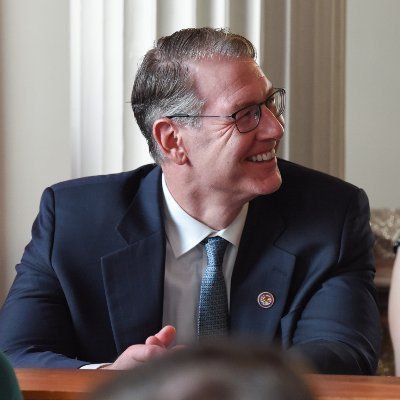
So they organized to stop it. And that puts Curran in a bind. Unless you look at the money.
He represents Downers Grove, where the Main Street Metra stop is among the busiest in the region. His district is full of residents who rely on trains to get to Chicago, to school, to jobs, and back home. If transit funding collapses, they’ll be first in line for service cuts.
Yet Curran voted against the bill. And in his Tribune op-ed, he repeated talking points that don’t hold up:
- Claim: The money would bail out pensions.
- Reality: The bill stabilizes daily operations – keeping trains and buses running – not pensions.
- Claim: It’s a "Chicago bailout."
- Reality: Metra runs through his own district. Pace serves the suburbs. Cutting funding hurts the collar counties as well as the city.
- Claim: A $1.50 delivery fee is regressive.
- Reality: What’s more regressive – occasionally paying a $1.50 "climate impact fee" for restaurant and retail deliveries (groceries and pharmacy items wouldn't be included) made by motor vehicle? Or being forced into $12,000 a year in car ownership costs because transit service has been slashed a projected 40 percent?
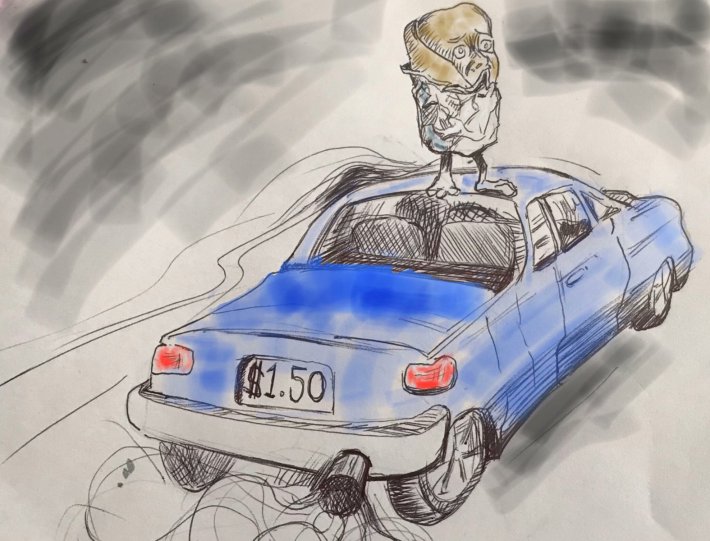
This is not an insinuation of bribery. It’s simply about structural incentives. If a lawmaker gets hundreds of thousands of dollars from road construction unions, they’re going to answer those calls first. When those donors say, "Don’t touch our highway money," transit riders are left on the back burner.
And while the construction lobby, including unions like Local 150, was one of the forces resisting transit funding – especially new toll revenue – they’ve recently signaled a potential partial shift. In May, they agreed to "allow" $200 million in road-fund interest to go toward the transit fiscal cliff. It’s a start, although it doesn’t erase years of pressure to keep highway funds untouchable.
However, this dynamic doesn’t just involve Curran. In Springfield, House Democrats spent months focused on governance reform without advancing a clear funding plan. Some transit advocates, who requested anonymity, told me they repeatedly urged politicians to draft a revenue proposal, but leadership stalled. By the time HB 3438, a combined reform-and-revenue bill passed the Senate the end of the spring session on May 31, minutes before midnight, House members said they hadn’t had enough time to review it.
Why a parallel funding bill never materialized – despite months of warnings – has yet to be clearly explained. Rep. Kam Buckner, one of those leading the charge on this issue, discussed the subject in an interview with Streetsblog, saying that the Public Transit Working Group felt more research was needed to create the "right" legislation. One could argue that was a case of letting the perfect be the enemy of the good.
As previously noted, all Senate Republicans, not just Curran, ultimately lined up in opposition to HB 3438. As Republican Sen. Don DeWitte explained, GOP lawmakers had already balked at a $1.4 billion statewide tax hike for the general budget. When Democratic leadership ultimately folded governance and revenue into a single bill, Republicans pulled their support completely.
It’s a dynamic as old as Illinois politics: county chairs want their board appointments, special interests want their funding streams, and taxpayers get squeezed, transit riders and drivers alike.
This is because roads don’t pay for themselves. In Illinois, gas taxes and tolls cover only about half the cost of building and maintaining highways – the rest comes out of general tax dollars. According to the Illinois Department of Transportation’s FY 2025–2030 Highway & Multimodal Improvement Program, the state plans to spend $41.42 billion overall, including $29.65 billion on highways alone, over six years. That's a cost ultimately subsidized by all taxpayers, whether they drive or not.
In contrast, transit is more efficient than cars at moving people, it's cheaper to maintain, and it actually pays off economically. A study by the U.S. Department of Energy, MIT, and Argonne National Laboratory showed that every $1 invested in CTA, Metra, and Pace generates $13 in economic benefit for the region.
So while every dollar spent on public transportation gets picked apart, billions in road spending sail through with barely a question. Illinois taxpayers are told to scrutinize transit like it’s a bailout, while road construction – which consumes far more money, is one of the most expensive in the country, and never breaks even – is treated as untouchable.
The timing couldn’t be worse. Without new revenue, we'll see drastic service cuts and possibly stiff fare hikes. Right now, both of those things are happening with Philadelphia's SEPTA after Pennsylvania legislators recently failed to pass a funding bill. In Illinois, that would mean fewer trains stopping in Downers Grove, Lemont, and Willow Springs, i.e. longer commutes, more traffic, and higher costs for the very "working families" Curran claims to defend.
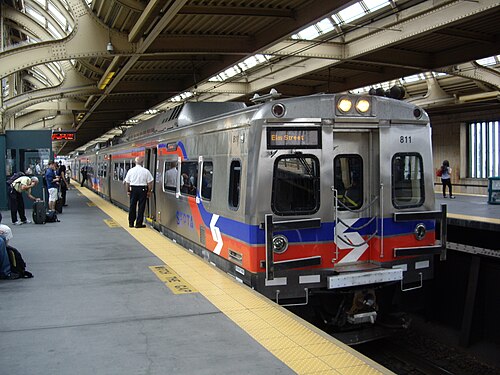
Disinvesting from transit doesn’t save money. Instead, it shifts costs onto transit commuters, drivers, and taxpayers in general. If lawmakers starve trains and buses, that will mean more cars on the road, and Illinois will need even bigger tax hikes down the line to repair crumbling highways. And it’s no coincidence that Local 150 has opposed raising tolls to support transit. They want to keep that revenue stream available for their own road-building campaigns.
Illinois needs a debate grounded in data, not talking points. And the fact is, gutting transit would be catastrophic for our entire state. According to the aforementioned study, cutting $771 million from Chicagoland’s transit budget could cost Illinois’ economy $14 billion a year. Factor in the ballooning costs of endless road expansion, and the case is clear.
Granted, focusing blame on just one senator or one lobby misses the point. This crisis reflects a system where every major player – Republican Senate obstruction, Labor, and Democratic House leadership – avoided making the hard decision to put riders first.
If Illinois is serious about an economically strong, sustainable, modernized future, lawmakers will need to stop treating roads as a golden child and transit as a stepchild. Constituents deserve leaders who put riders first, not donors.
Specifically, residents of Downers Grove, Lemont, and Willow Springs deserve to know why Sen. John Curran opposed a plan to keep their trains running while accepting the largest donations of his career from road construction interests.
Update 9/16/25, 6:00 p.m., by Elle Steinke
After publication of this piece, we received questions from the Illinois Senate Republican Caucus about campaign-finance data. Streetsblog Editor John Greenfield agreed with their spokesperson that it would be appropriate for us to provide charts showing how donations from road-building interests to other key players in the transit bill talks compare to Curran's. We found that over the years, all of these lawmakers received some donations from these organizations. But Curran is the only one of these politicians whose chart shows a dramatic increase during the recent transit funding negotiations, compared to earlier years.
I reviewed Illinois State Board of Elections filings for other key legislators using the same 2017–2025 window and confirmed that Chicagoland Operators Joint Labor-Management PAC and LiUNA Chicago Laborers District Council have contributed substantial sums to leaders of both parties, including Senate President Don Harmon and House Speaker Chris Welch. Those figures are now reflected in the comparison charts below. All data come from the Illinois State Board of Elections, accessed via the Illinois Sunshine database.
Streetsblog's interviews with all of these politicians except Curran (who declined our offer) are linked below.
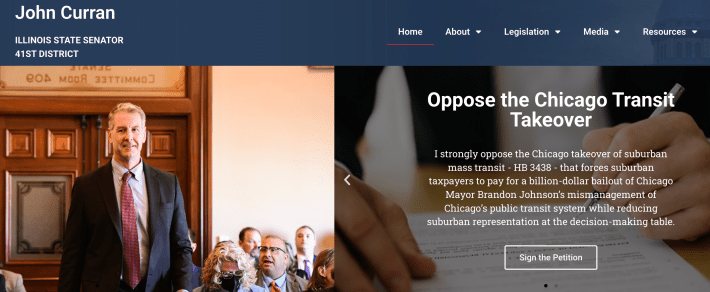
Republican State Sen. John Curran, the noisiest Senate transit governance/funding bill opponent
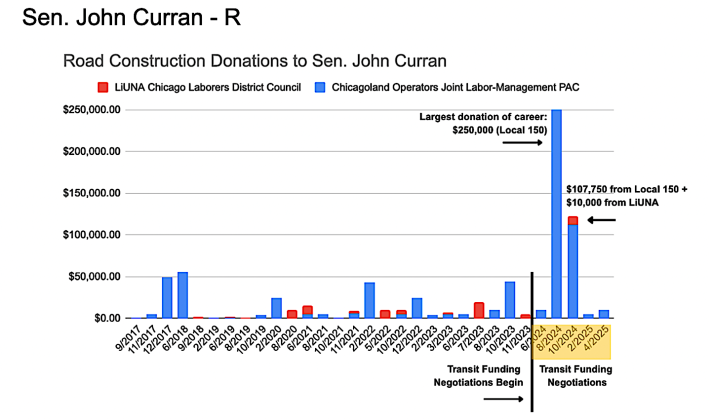
Democratic State Sen. Ram Villivalam, the sponsor of the Senate transit bill
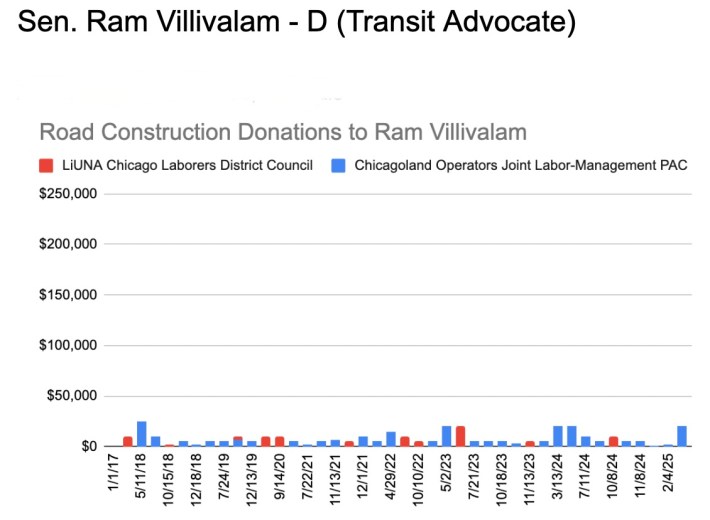
Democratic Senate President Don Harmon
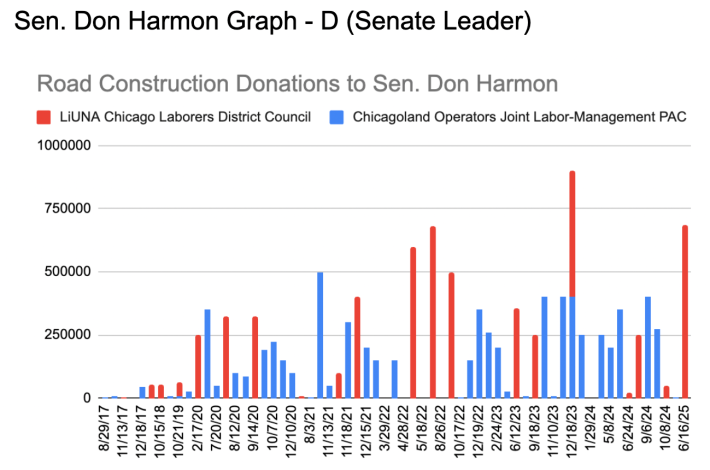
Democratic House Speaker Chris Welch
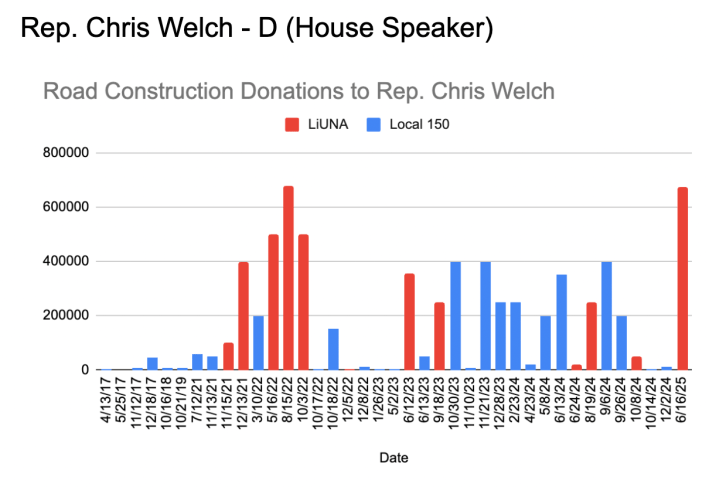
Democratic House Majority Leader Eva-Dina Delgado, co-leader of the House's Public Transit Working Group,
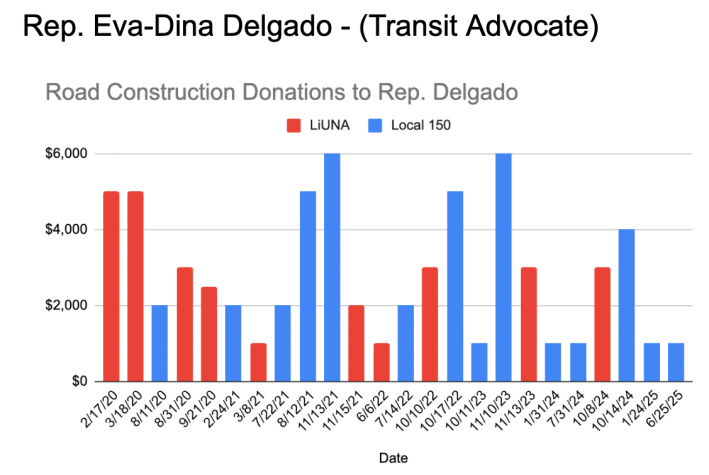
Democratic State Rep. Kam Buckner, co-leader of the House's Public Transit Working Group
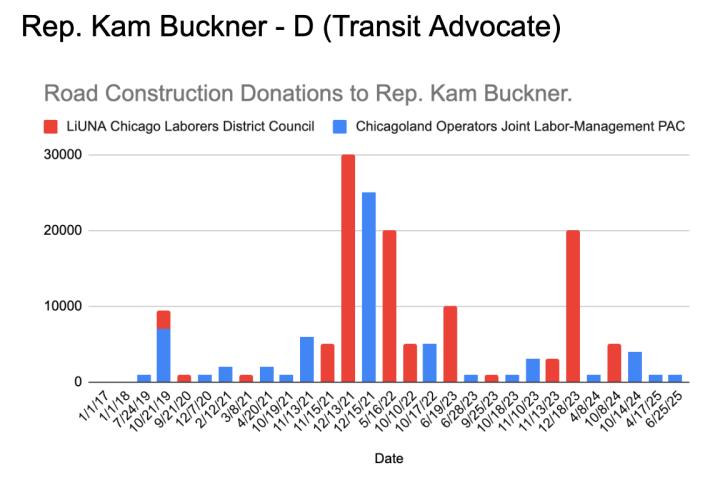
Republican State Sen. Don DeWitte, a former Regional Transportation Authority board member, Minority Spokesperson on the Senate Transportation Committee, recently took a transit fact-finding trip to Germany, opposed to additional taxes, fees, or surcharges to fund transit
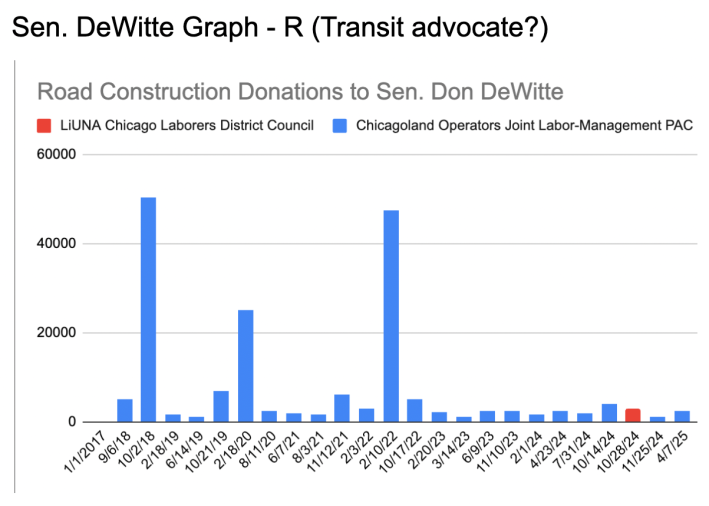
Republican State Sen. Seth Lewis, on the Senate Transportation Committee, recently took a transit fact-finding trip to Germany, opposed to additional taxes, fees, or surcharges to fund transit
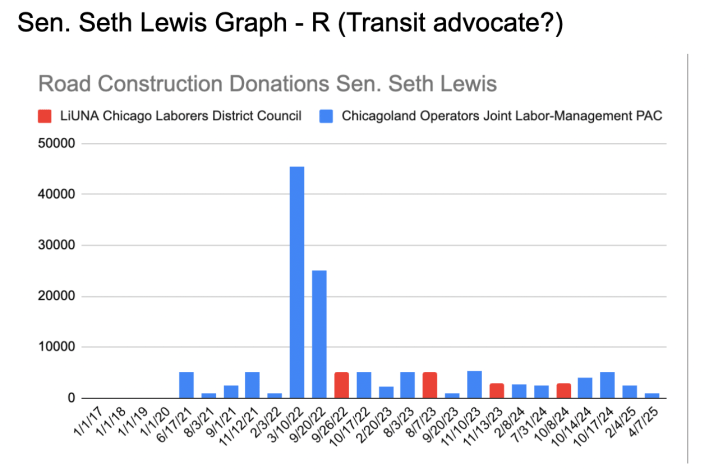
So there are the receipts that the Illinois Senate Republican Caucus spokesperson requested. To recap one more time, basically all of the key players in the current transit reform/revenue talks have received donations from these road-building interests since 2017. But Streetsblog Chicago would be glad to hear Sen. John Curran's explanation of why, compared to previous years, his donations skyrocketed during recent months.
Update 9/16/25, 6:00 p.m., by John Greenfield, editor
In addition to the Illinois Senate Republican Caucus' reasonable request that Streetsblog Chicago provide data about donations to other key politicians in the transit bill discussions, the spokesperson made another valid point.
I contacted that person in late August to request an interview with Curran, partly about his objections to the bill. At the time I was instead directed to interview Republican Senator Don DeWitte, Minority Spokesperson on the Senate Transportation Committee, which turned out to be an illuminating conversation.
However, my request for an interview with Curran was made before Ellen pitched her op-ed about his donations from road-building interests to Streetsblog, in early September. Therefore, the spokesperson correctly said today that it would have been courteous for us to circle back and offer Curran's team the opportunity to respond to Ellen's statements before publication. I apologize for the oversight, and will keep this experience in mind moving forward.
However, I've told the spokesperson that if Curran would like to provide a response to this article in the near future, I would be happy to add it as an update to this article. I would be interested to hear his explanation for why his stiff opposition to the transit funding bill correlates with the steep increase in his donations from road-building interests.
To reflect the new data Ellen provided for comparison, I've updated the headline of this article from "Road builders have fueled Curran's campaigns" to "[Curran has] seen a recent spike in donations from road builders." In fairness, all of the politicians discussed here have gotten campaign help from the road-building interests. But Curran is the only one who enjoyed a recent relative windfall.
Update 9/17/25, 12:30 p.m., by John Greenfield, editor
Tuesday evening, the Illinois Senate Republican Caucus spokesperson voiced another objection to this piece, arguing that Local 150 officially submitted a witness slip supporting the final version of HB 3438. They asserted that this nullifies Ellen's argument that the union's recent large donations to Curran likely influenced his loud opposition to the legislation. Here's Ellen's response to that concern, which we've assembled from two emails that we shared with the spokesperson.
– John Greenfield, editor
Update 9/17/25, 12:30 p.m., by Ellen Steinke
On the Local 150 question: I double-checked the witness-slip record you linked. The only relevant entry is from Marc Poulos [executive director of the Chicagoland Operators Joint Labor-Management PAC], who listed "Local 150 Operating Engineers" in the organization field.
Although the tollway surcharge was viewed as the most substantial, immediate, and inflation-proof funding mechanism, Local 150 repeatedly voiced skepticism about it and supported the bill only after that proposal was removed. The replacement revenue sources were newer, less popular, and expected to take one to three years to produce funds.
I agree it’s accurate that Illinois treats a witness slip filed "on behalf of” an organization as an official position for that specific amendment. Our article has never disputed that Marc Poulos filed a proponent slip representing Local 150 on Senate Amendment 3 [to HB 3438].
My point, and the reason I don’t view a correction as warranted, is that this procedural filing doesn’t fully capture the broader context we reported:
- The slip reflected support for the third amendment which was filed after the tollway-surcharge funding was removed, which Local 150 had previously opposed.
- Throughout negotiations, Local 150 consistently voiced skepticism toward the tollway funding mechanism, which was widely viewed as the most significant, long-term revenue source in earlier drafts.
- Local 150 has not issued a public statement of broad support for HB 3438 as originally conceived, and its PAC activity and lobbying history on highway funding remain a central part of the story.
So while I acknowledge that the witness-slip record shows organizational support for that late-stage amendment, I stand by the article’s analysis that Local 150's overall posture and financial activity worked to limit the strongest transit-funding options.
[Ellen then told the spokesperson the following.]
If you’d like to provide a public statement explaining Local 150's position, especially how the organization differentiates between the final amendment and the earlier funding proposals, I’d be glad to see Streetsblog publish it in full so readers can weigh it directly.
Correction 9/17/25, 1:30 p.m., by John Greenfield, editor
A previous version of this article stated that Sen. Ram Villivalam received no donations from road-building interests, based on a search for donations under his name. However Streetsblog later found such donations via a search for the committee "Friends of Ram," albeit much smaller ones than Sen. John Curran's recent donations. We've edited the article accordingly. Apologies for the error.
Corrections 9/23/25: 12:30 p.m., by John Greenfield, editor
After Local 150 submitted a list of objections to this article – Streetsblog Chicago will likely publish a full update on that issue in the near future – Ellen Steinke reviewed their complaints. She confirmed there were a few more relatively minor factual errors in the reporting and updates. I apologize for not previously catching these erroneous statements, and appreciate the union pointing them out.
While Streetsblog will probably discuss Local 150's grievances with the article at length soon, in the meantime, I wanted to help ensure there isn't any misinformation on our website. In brief, here's a few corrections I've made in the above article and updates, and we will hopefully be able to provide a full explanation later this week.
• Ellen's original statement "In August, [Local 150] agreed to 'allow' $200 million in road-fund interest to go toward the transit fiscal cliff" has been changed to "In May, [Local 150] agreed to "allow" $200 million in road-fund interest to go toward the transit fiscal cliff."
• I have deleted this statement from Ellen's 9/17/25 update, "A witness slip reflects the filer’s personal position and isn’t automatically an official endorsement from the union or its PAC." We assembled the response from two of her emails to the Republican Caucus spokesperson. Ellen recently said that in the first email, she was unclear that Marc Poulos was, in fact, indicated as representing Local 150. Sorry for the error, which was largely a mix-up on my part.
• After Ellen further reviewed testimony and witness slips, this passage from her 9/17/25 update:
“Local 150’s public statements throughout negotiations, especially on the tollway funding mechanism, remained skeptical. Further, Marc Poulos himself was the person repeatedly quoted in our earlier articles as speaking for Local 150 when opposing that tollway funding, which was expected to be the main funding source."
Has been edited to:
"Although the tollway surcharge was viewed as the most substantial, immediate, and inflation-proof funding mechanism, Local 150 repeatedly voiced skepticism about it and supported the bill only after that proposal was removed. The replacement revenue sources were newer, less popular, and expected to take one to three years to produce funds."
Ellen explained her reasoning for the change: "That captures what we can document without implying [Local 150] fought the entire bill.”

Do you appreciate Streetsblog Chicago's paywall-free sustainable transportation reporting and advocacy? We officially ended our 2024-25 fund drive in July, but we still need another $43K+ to keep the (bike) lights on in 2026. We'd appreciate any leads on potential major donors or grants. And if you haven't already, please consider making a tax-deductible donation to help us continue publishing next year. Thanks!
